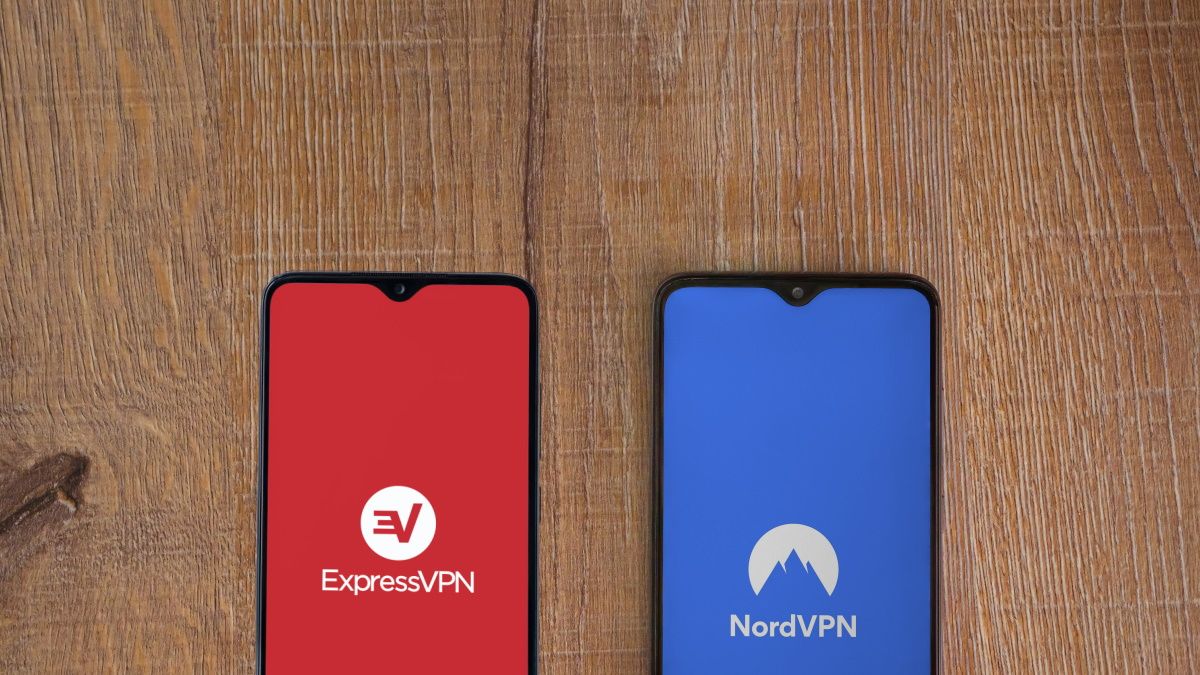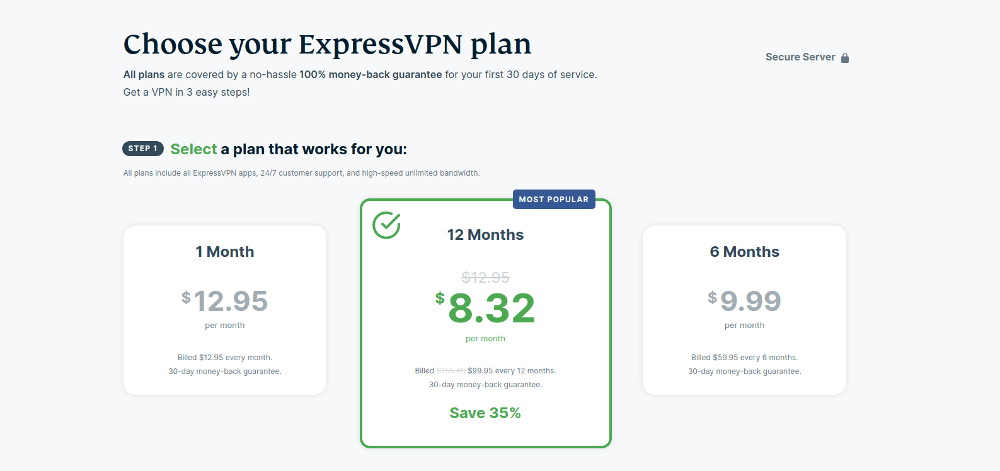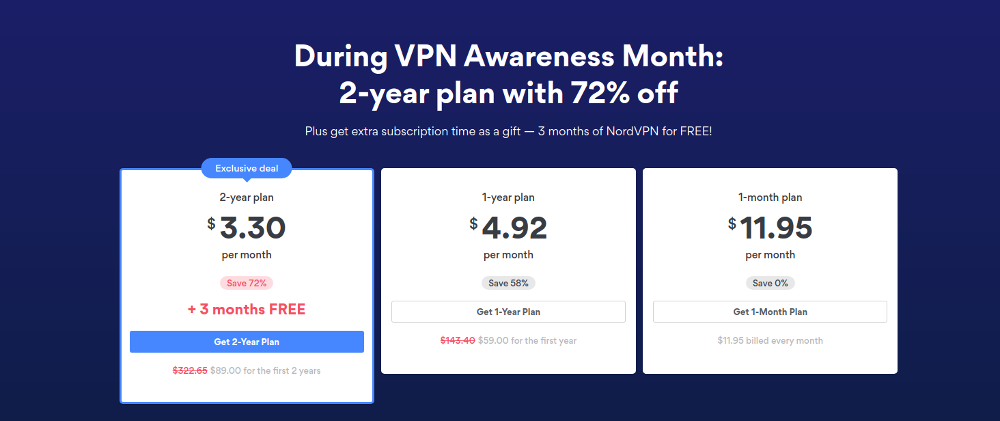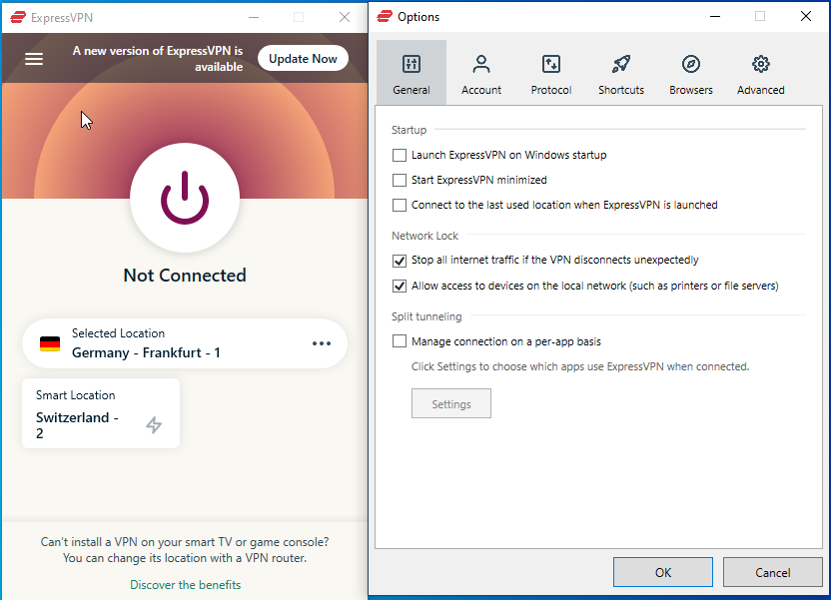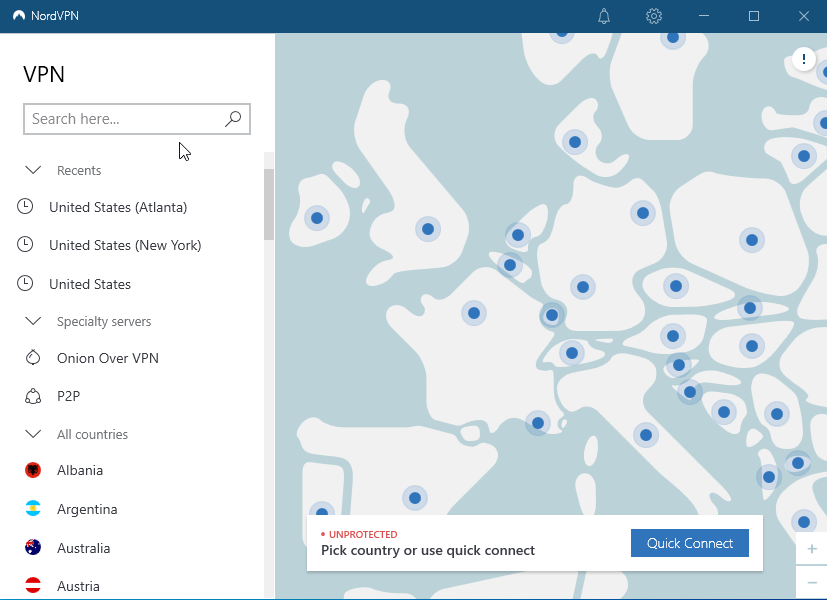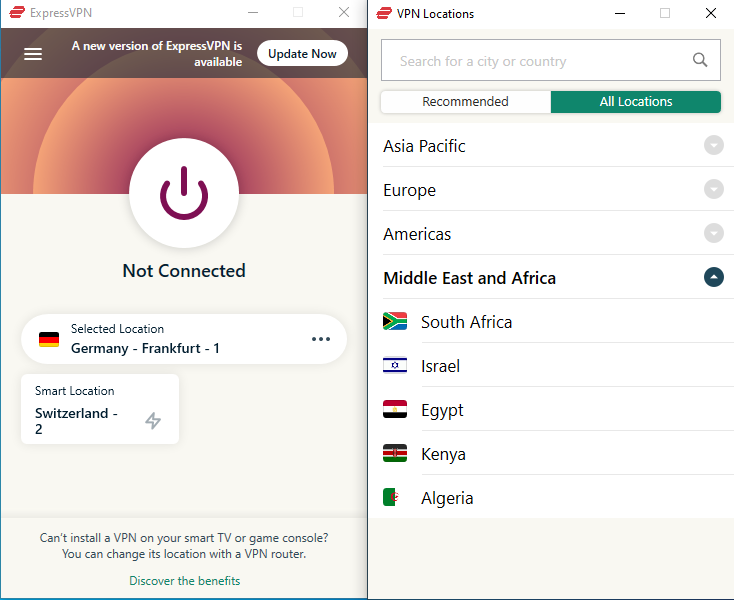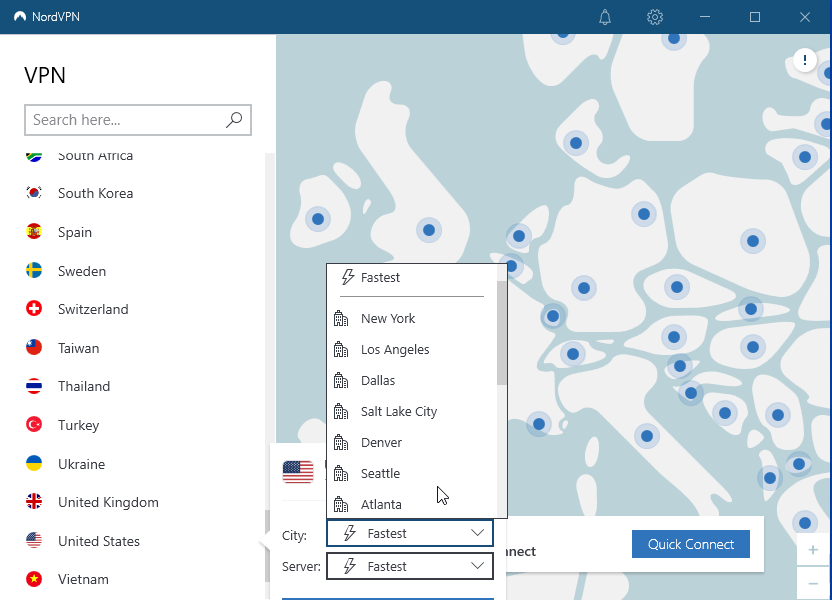If you're looking for the best VPN for your needs, chances are you'll run into the names of ExpressVPN and NordVPN. Both dominate the VPN market thanks to their extensive features, speed, and general usability. To figure out which one is the better fit for you, we're going to compare them across several criteria and see which one comes out on top.
In short, we think ExpressVPN is the better choice as it's faster and easier to use, but it has major downside: It's pretty pricey. NordVPN picks up the slack, offering great value on its multi-year plans. NordVPN is a little more customizable, too.
ExpressVPN vs. NordVPN Features
Let's start with features. Overall, NordVPN offers more different features, while the ExpressVPN experience is a lot less customizable. That said, ExpressVPN is a slightly more effective VPN. It gets things done a lot better than NordVPN does.
Netflix and Other Streaming Services
ExpressVPN gets into Netflix and other streaming services more easily than NordVPN. Despite the recent Netflix VPN crackdown, ExpressVPN still gets into other countries' Netflix libraries although it's gotten a lot harder to use a VPN with Netflix.
NordVPN doesn't do nearly as good a job since Netflix updated its detection system. Although we have received reports that some NordVPN servers in the United States are working with Netflix, we couldn't recreate the results ourselves.
As such, we're going out on a limb and saying that ExpressVPN is the best pick for people that want to use a VPN to stream TV shows and movies. At the same time, we're going to hedge our bets a little and remind readers that your mileage may very well vary as which servers work and which don't is constantly changing.
Speed and Server Count
One thing that may influence something like getting through to Netflix is the amount of servers each service has available. In pure numbers, NordVPN is the clear winner here, with well over 5,000 servers in 60 countries, while ExpressVPN offers more than 3,000 in more than 90 countries.
But, even though 5,000 is a lot more than 3,000, numbers don't tell the whole story here. For one, the geographical spread ExpressVPN offers may be a better deal for some people, especially if they need the IP address of a specific country and NordVPN doesn't happen to have it.
Also, it seems that ExpressVPN's servers work better than NordVPN's do. Connection times are faster. The speeds you get are generally better, too. We say "generally" because NordVPN is very hit and miss: Its fastest servers are better than what ExpressVPN has to offer, but more often than not you'll get a slow server.
ExpressVPN doesn't have this problem nearly as badly, and you always get more or less the same speeds, keeping geographical distance in mind. Overall, our experience with ExpressVPN is a lot better.
Torrenting
If you're mostly interested in getting a VPN so you can download torrents, both services will work fine. ExpressVPN has the speed and security to keep you anonymous, while NordVPN offers some extra features. For example, NordVPN offers special P2P servers, which promise a higher capacity and speed, although in practice we haven't noticed that much of a difference.
What is interesting about NordVPN is that it offers a specialized kill switch: In most cases, a kill switch will just shut down your internet whenever the connection with the VPN server is interrupted. It's a vital failsafe. ExpressVPN and NordVPN both offer one, but NordVPN also offers a specialized version that switches off only certain apps' access to the internet.
This is great for torrenters, as you can set your BitTorrent client to shut down when the VPN fails, yet keep all your other programs running. It's a cool little feature, and it will be very handy for certain users.
Security Features
NordVPN and ExpressVPN offer a wealth of security features. Both offer high-grade encryption as the default (AES-256, though thankfully the words "military-grade encryption" seem to have disappeared from their homepages) and the aforementioned kill switch.
As for VPN protocol, the method through which the VPN "talks" to sites, each service defaults to their own custom-made protocol. We've previosly covered ExpressVPN Lightway, and it's a solid, fast protocol, while NordVPN offers Nordlynx, which is based on WireGuard, another top-of-the-line protocol. Both seem solid options, but you can always switch to the standard OpenVPN if you so wish.
NordVPN also offers some interesting features like Double VPNs, which send your connection through two VPN servers, one after the other. While this may seem cool, there doesn't seem to be any real advantage to this as all it does is slow down your VPN connection even more with all the miles it has to travel. Also, if one VPN server won't secure your connection, a second one won't help much with that.
A last interesting and less cosmetic feature is NordVPN's CyberSec, an adblocker. After playing around with it, though, we don't see too much difference with other common adblockers, so it's more of an interesting bonus than a reason to sign up to NordVPN.
Price
While we like ExpressVPN's features better than we do NordVPN's, it comes at a price. ExpressVPN is one of the most expensive VPNs on the market at just under $100 per year. Even getting three months extra for free on signup doesn't take the edge off that.
NordVPN is a lot cheaper at $89 for the first two years, though at the end of that time, the cost of renewing will be well over $300. Still, $89 for two years of service is less than half of $100 for one year. If all else is equal to you, you're probably best off signing up for NordVPN and then revisiting the issue in two years time.
In our experience, NordVPN is always offering some kind of promotion or another, so you can freely ignore the countdown timers and other promotional banners.
Whichever VPN you go with, both offer a 30-day money-back guarantee, so if you're not happy, just cancel your subscription within that time frame and you'll get all your money back. We've never had issues with this refund, and we haven't heard stories of people who have.
Privacy
When it comes to privacy, both contenders score well. The ExpressVPN privacy policy and NordVPN privacy policy both make expressly clear that neither keeps logs. However, as we discuss at length in our coverage of no-log VPNs, there's no good way to make sure of that. In the end, we're taking both services at their word.
That said, there has been no indication that either ExpressVPN or NordVPN have been playing fast and loose with customer data. Though there will always be speculation and rumor floating about the internet---it's the nature of the beast---the only blemish we can find is the 2019 NordVPN hack in which a third party got access to NordVPN's servers.
Some of the details surrounding that event are a bit odd, but overall the company acted about as well as you could expect, so it's nothing we can hold against it. Both services get our seal of approval when it comes to privacy.
Ease of Use
ExpressVPN and NordVPN are easy to use but do take different approaches. ExpressVPN gives you one big button to switch the VPN on and off and, below it, a smaller button to pick a server. There are also some bare-bones settings to mess with, but nothing special. The app keeps it simple, you set it and forget it.
NordVPN also has one button to switch it on and off---though hasn't placed it as prominently---but other than that has a widely different interface. For one, the main interface is an interactive map where you can see where you might connect to---great if you want some geographical insight.
If you go into the settings menu, though, you'll see where NordVPN shines. Where ExpressVPN only lets you toggle a handful of functions, NordVPN has all kinds of bells and whistles. One example is the kill switch we mentioned earlier, but there are also some great ways to fine-tune split tunneling, like setting up the VPN only for specific apps. It's pretty nifty.
Selecting Servers
What's less fun, though, is picking a specific server. While both services have an autopicker---which works really well---finding a specific server is a lot easier with ExpressVPN. You get a massive list to pick from with different locations for most countries.
Not so with NordVPN, which lets you pick a location and then has you scroll through the list of servers it has there. However, as it has so many, you're often stuck scrolling for a while, hoping the next one is the one that gets you into Netflix.
To a certain extent, you have this same problem with ExpressVPN, but it's easier to remember a server name like "New York #1" than "United States #814." Though it may seem minor, finding the right server on NordVPN gets annoying fast and it's a big strike against it.
To sum up: If you're the set-it-and-forget-it type, then ExpressVPN is probably the VPN for you. If you like to fiddle around a little more with settings, then NordVPN is likely the ticket. Generally, though, we prefer ExpressVPN's minimalist approach more.
The Verdict
Overall, we prefer ExpressVPN over NordVPN. While we like that NordVPN is a bit more flexible, many of its features seem like extras---or even cosmetic.
ExpressVPN may offer less at first glance, its improved speeds and ability to get into Netflix more consistently rank it higher in our eyes.
Still, at less than $90 for two years, NordVPN is an interesting deal, especially if streaming isn't too high on your list of priorities.

ExpressVPN
ExpressVPN is our favorite VPN. It's fast, easy to use, and works well with streaming services. It's more expensive then NordVPN but is worth every penny.
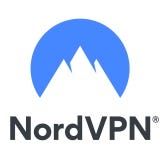
NordVPN
NordVPN offers more options than ExpressVPN and is cheaper, too. While ExpressVPN is our top pick, you can't go wrong with either.

